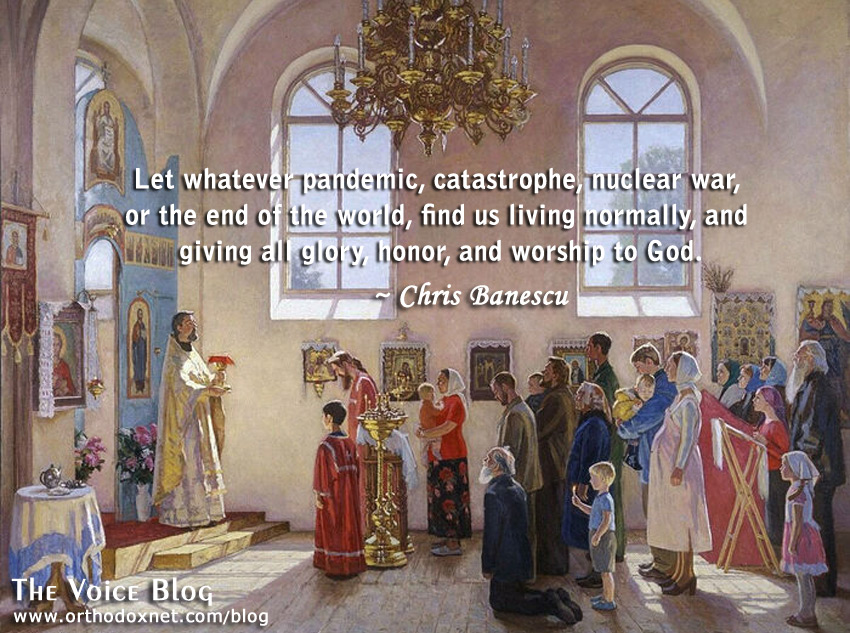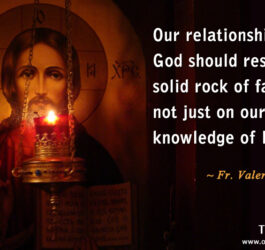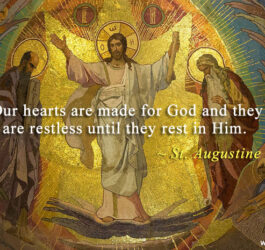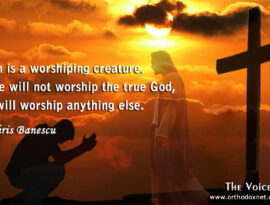 by Chris Banescu –
by Chris Banescu –
After enduring two years of coronavirus disruptions and madness, we all hoped our lives would return to some semblance of normality. But thanks to Vladimir Putin’s terrible decision to invade Ukraine, the world may be at the brink of World War III. We just reached the end of one global life-changing crisis, only to face an even more ominous, potentially world-destroying, calamity.
How can we live normal lives when insanity spreads all around us? How should we conduct ourselves with potential Armageddon hanging over our heads? How do we preserve our humanity while the world descends into chaos and madness?
Similar questions were asked decades ago, when the arrival of atomic bombs changed the nature of war and forever altered the course of history. In his “On Living in an Atomic Age” essay from 1948, C.S. Lewis addressed the fear and uncertainty that nuclear annihilation brought to mankind. “How are we to live in an atomic age?” Lewis wrote. “Why, as you would have lived in the sixteenth century when the plague visited London almost every year, or as you would have lived in a Viking age when raiders from Scandinavia might land and cut your throat at night; or indeed, as you are already living in an age of cancer, an age of syphilis, an age of paralysis, an age of air raids, an age of railway accidents, an age of motor accidents,” he advised.
We seem to forget that periods of peace and tranquility are but brief interludes in history. “Human life has always been lived on the edge of a precipice,” Lewis wrote in his “Learning in War-Time” address. Normality is the exception, not the rule of human existence. “We are mistaken when we compare war with ‘normal life.’ Life has never been normal. Even those periods which we think most tranquil, like the nineteenth century, turn out, on closer inspection, to be full of cries, alarms, difficulties, emergencies,” observed Lewis.
We are mistaken if we think our present circumstances are different. The world has not gone mad. The world has always been mad. Ever since Adam and Eve disobeyed God and rejected His wisdom, death entered creation and man has endured trials, tribulations, pain, and suffering. “In the sweat of your face you shall eat bread, Till you return to the ground, For out of it you were taken; For dust you are, And to dust you shall return” (Genesis 3:19).
Our rebellion against and alienation from God brought abnormality to human life and created a permanent state of war in the universe. “What Satan put into the heads of our remote ancestors was the idea that they could ‘be like gods’—could set up on their own as if they had created themselves—be their own masters—invent some sort of happiness for themselves outside God, apart from God. And out of that hopeless attempt has come nearly all that we call human history—money, poverty, ambition, war, prostitution, classes, empires, slavery—the long terrible story of man trying to find something other than God which will make him happy,” Lewis reminds us in Mere Christianity.
From the Fall until now, each generation has had to endure injustice, strife, wars, sickness, pain, suffering, and death. This is the current state of the fallen world and only Christ’s Second Coming will redeem, renew, and restore it—along with all of creation.
So what can we do? How should we live when the world descends into darkness and insanity rages around us?
First, love God with our whole hearts, minds, and souls. And we show our love for God best when we keep His commandments. “If you love Me, keep My commandments” (John 14:15).
Second, regularly pray and participate in the Church’s sacramental life. That’s how we find genuine life, “I have come that they may have life, and that they may have it more abundantly” (John 10:10), and restore our true humanity. “In Christ and the Holy Spirit everything which is sinful and dead becomes holy and alive by the power of God the Father. And so in Christ and the Holy Spirit everything in the Church becomes a sacrament, an element of the mystery of the Kingdom of God as it is already being experienced in the life of this world,” teaches Fr. Thomas Hopko.
Third, continually cling to Christ and trust Him alone. “Put not your trust in princes and sons of men in whom there is no salvation” (Psalm 146:3). “Be always with Christ and trust God in everything,” reminds us Fr. Hopko.
Finally, live normal lives and don’t despair. Don’t live in constant fear. “If we are all going to be destroyed by an atomic bomb, let that bomb when it comes find us doing sensible and human things—praying, working, teaching, reading, listening to music, bathing the children, playing tennis, chatting to our friends over a pint and a game of darts—not huddled together like frightened sheep and thinking about bombs. They may break our bodies (a microbe can do that) but they need not dominate our minds,” wrote Lewis.
Let whatever pandemic, catastrophe, nuclear war, or the end of the world, find us living normally, and giving all glory, honor, and worship to God.




